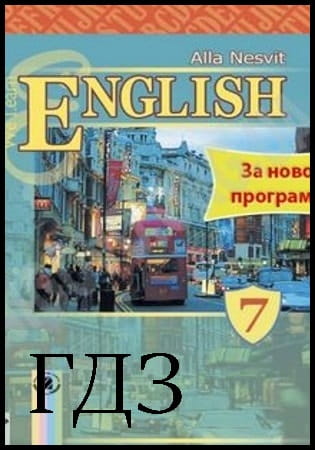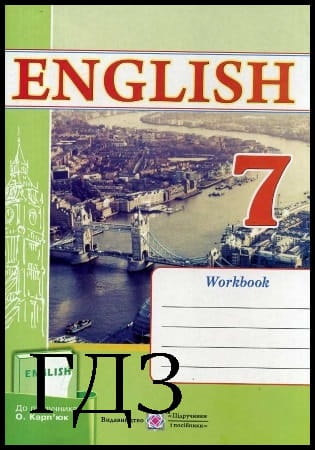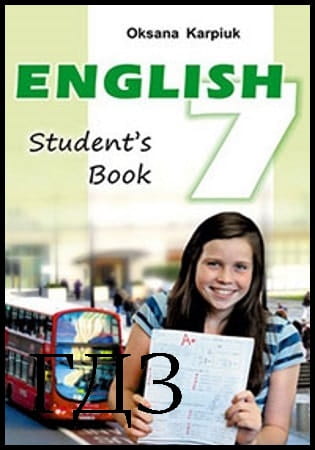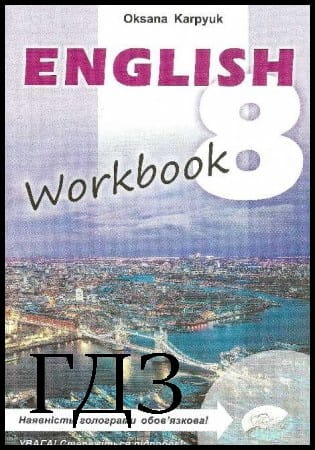ГДЗ Англійська мова 7 клас. Зошит для контролю [Мясоєдова С.В.] 2015
Reading (The first semester) Variant 2
1. Read the text and circle the correct answer.
Many parents in Britain try to get their kids to study more by giving them money. However it does not help students to get better marks for their exams. Surprisingly, but the promise of a trip to a nice and interesting place could encourage students to try harder and do better at school. Researchers from tne University of Bristol in England looked at how promises of cash and tickets to events affected students' studying and learning. Over 10,000 pupils took part in the research. There was an improvement in classwork and homework, but inis did not result in better test scores.
Education expert Dr Kevan Collins said good teachers were better than promises of rewards to get children to study, especially for children from low-income families. He added that some pupils have a lot of goals and believe that education is a way of getting what they want out of life, but there are kids who think that working hard doesn't make a difference.
Ho wrote: «What really makes the difference is how students are taught.»
1) The text is..
(a) fay an article.
b) a letter.
c) a story.
d) a dialogue.
2) According to the text..
(a) money can't improve students' exam results.
b) students show better exam results when they are paid for it.
c) oil the students who study well are taken to nice trips.
d) parents always pay their children if they get good marks.
3) All the students who took part in the experiment...
a) showed better resuits in tests.
b) were from the University of Bristol.
(c) had some improvement in classwork and homework.
d) went on a trip.
4) Dr Kevan Collins..
a) is a teacher.
(b) believes that good teachers are more important than promises of rewards.
c) says that most children are determined.
d) doesn't think a method of teaching makes a difference.
2. Read the text and complete it with the sentences from the box.
a) Before that happened, I tried all the usual methods.
b) She's already old enough to help out.
c) I'd sigh and say, «In a minute.»
d) Isn't that what we all want?
My children are wonderful — smart and cute and generally delightful. However it took me years to work out how to encourage them to help with the household chores. (a) Before that happened, I tried all the usual methods.) wrote out lists of chores and let my children choose. I tried to make chores to be games. I showed my children what happened if nobody did chores. And yes, the chores got done and we lived in a clean and tidy house. But my children worked only because asked them to do it.
I knew there must be a better way, but for a long time, I was too busy and tired to discover it.
Then one day I thought about how reacted when my children asked me for help. «Can you help me with this please, mum?» one of them would say.
(c) I'd sigh and say, «In a minute.») Quite often that minute turned into hours. One day I decided to try something new. «Can you help me with this please, mum?» asked Charlotte. «Of course I can,» I replied, putting down my own work immediately. I remembered to smile at the same time. It wasn't easy at first. But it's a pleasure doing things for those we love.
Regularly throughout the day, Gemma-Rose comes to me and asks, «Can I do anything for you, mum?» (b) She's already old enough to help out.) She makes me a cup of coffee. She arranges some flowers in a vase and places them in my bedroom. «We like helping you, mum.»
Children who like to help? (d) Isn't that what we all want?) And I have discovered I like to help them, too, especially when it's not expected.
3. Read the text of ex. 2 and answer the questions.
1) How long did it take the mother to work out how to encourage children to help with the household chores?
(It took her years.)
2) Why did the mother sometimes forget to do what her children asked her to?
(Because she had a lot of household chores.)
3) Did the mother manage to change her behaviour?
(Yes, she did.)
4) Which of her children makes her a cup of coffee?
(Her daughter - gemma-rose makes her a cup of caffe.)
Many parents in Britain try to get their kids to study more by giving them money. However it does not help students to get better marks for their exams. Surprisingly, but the promise of a trip to a nice and interesting place could encourage students to try harder and do better at school. Researchers from tne University of Bristol in England looked at how promises of cash and tickets to events affected students' studying and learning. Over 10,000 pupils took part in the research. There was an improvement in classwork and homework, but inis did not result in better test scores.
Education expert Dr Kevan Collins said good teachers were better than promises of rewards to get children to study, especially for children from low-income families. He added that some pupils have a lot of goals and believe that education is a way of getting what they want out of life, but there are kids who think that working hard doesn't make a difference.
Ho wrote: «What really makes the difference is how students are taught.»
1) The text is..
(a) fay an article.
b) a letter.
c) a story.
d) a dialogue.
2) According to the text..
(a) money can't improve students' exam results.
b) students show better exam results when they are paid for it.
c) oil the students who study well are taken to nice trips.
d) parents always pay their children if they get good marks.
3) All the students who took part in the experiment...
a) showed better resuits in tests.
b) were from the University of Bristol.
(c) had some improvement in classwork and homework.
d) went on a trip.
4) Dr Kevan Collins..
a) is a teacher.
(b) believes that good teachers are more important than promises of rewards.
c) says that most children are determined.
d) doesn't think a method of teaching makes a difference.
2. Read the text and complete it with the sentences from the box.
a) Before that happened, I tried all the usual methods.
b) She's already old enough to help out.
c) I'd sigh and say, «In a minute.»
d) Isn't that what we all want?
My children are wonderful — smart and cute and generally delightful. However it took me years to work out how to encourage them to help with the household chores. (a) Before that happened, I tried all the usual methods.) wrote out lists of chores and let my children choose. I tried to make chores to be games. I showed my children what happened if nobody did chores. And yes, the chores got done and we lived in a clean and tidy house. But my children worked only because asked them to do it.
I knew there must be a better way, but for a long time, I was too busy and tired to discover it.
Then one day I thought about how reacted when my children asked me for help. «Can you help me with this please, mum?» one of them would say.
(c) I'd sigh and say, «In a minute.») Quite often that minute turned into hours. One day I decided to try something new. «Can you help me with this please, mum?» asked Charlotte. «Of course I can,» I replied, putting down my own work immediately. I remembered to smile at the same time. It wasn't easy at first. But it's a pleasure doing things for those we love.
Regularly throughout the day, Gemma-Rose comes to me and asks, «Can I do anything for you, mum?» (b) She's already old enough to help out.) She makes me a cup of coffee. She arranges some flowers in a vase and places them in my bedroom. «We like helping you, mum.»
Children who like to help? (d) Isn't that what we all want?) And I have discovered I like to help them, too, especially when it's not expected.
3. Read the text of ex. 2 and answer the questions.
1) How long did it take the mother to work out how to encourage children to help with the household chores?
(It took her years.)
2) Why did the mother sometimes forget to do what her children asked her to?
(Because she had a lot of household chores.)
3) Did the mother manage to change her behaviour?
(Yes, she did.)
4) Which of her children makes her a cup of coffee?
(Her daughter - gemma-rose makes her a cup of caffe.)
 ГДЗ Англійська мова 7 клас Зошит для контролю Зошит Мясоєдова 2015 Ранок
ГДЗ Англійська мова 7 клас Зошит для контролю Зошит Мясоєдова 2015 Ранок
 Якщо помітили в тексті помилку, виділіть її та натисніть Ctrl + Enter
Якщо помітили в тексті помилку, виділіть її та натисніть Ctrl + Enter 28.04.2018,
28.04.2018,
 5 997,
5 997,
 0
0
 Назад
Назад




![ГДЗ Природознавство 5 клас. Підручник [Ярошенко О.Г., Бойко В.М.] 2018 ГДЗ Природознавство 5 клас. Підручник [Ярошенко О.Г., Бойко В.М.] 2018](/uploads/posts/2019-04/1555779316_5_p_y_u2018.jpg)
![ГДЗ Основи правознавства 9 клас. Підручник [Наровлянський О. Д.] 2017 ГДЗ Основи правознавства 9 клас. Підручник [Наровлянський О. Д.] 2017](/uploads/posts/2019-02/1550928122_9k_p_n_2017.jpg)
![ГДЗ Українська мова 8 клас. Підручник [Глазова О.П.] 2021 ГДЗ Українська мова 8 клас. Підручник [Глазова О.П.] 2021](/uploads/posts/2021-10/1633720388_8k_y_g_2021.jpg)
![ГДЗ Вступ до історії 5 клас. Підручник [Гісем О.В.] 2018 ГДЗ Вступ до історії 5 клас. Підручник [Гісем О.В.] 2018](/uploads/posts/2019-07/1564163269_5k_i_h_2018.jpg)